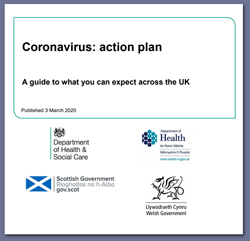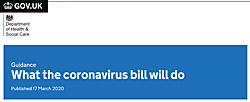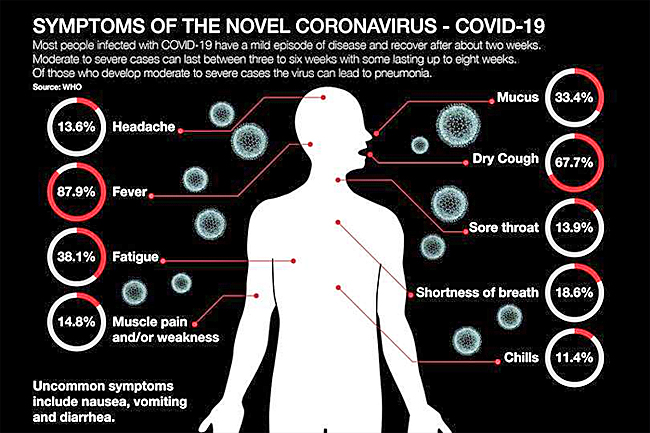The government has today published its proposed new emergency Coronavirus Bill which contains a great number of challenges for our civil rights and privacy.
Given that the UK Government’s approach constitutes one of being on a ’war footing’, it is hoped that the public will get behind these emergency powers.However, there are serious concerns in relation to law enforcement being used in order to maintain ‘social distancing’ and ‘self isolating’ in the event people do not adhere to government requests for this type of action as and when the government determines it necessary.
 The opening of the document provides an introduction by giving the background to the Bill and refers to the previously published (3rd March 2020) Coronavirus Plan. It says, amongst other things:
The opening of the document provides an introduction by giving the background to the Bill and refers to the previously published (3rd March 2020) Coronavirus Plan. It says, amongst other things:
‘The development of an effective response to the epidemic requires a number of actions. Some of these involve the use of tools and powers that are set out in statute. The governments of the UK therefore resolved to review and where necessary amend the legislation, to ensure that the UK’s response is consistent and effective.
Some of the proposed changes therefore deal with easing the burden on frontline NHS and adult social care staff, some help staff by enabling them to work without financial penalty, and some support people and communities in taking care of themselves, their families and loved ones, and their wider community.
The legislation will be time-limited – for 2 years – and not all of these measures will come into force immediately. The bill allows the 4 UK governments to switch on these new powers when they are needed, and, crucially, to switch them off again once they are no longer necessary, based on the advice of Chief Medical Officers of the 4 nations.’
Inevitably, it also deals with deaths of people who contract the disease and with burial services:
‘The steps the government is taking to respond to the COVID-19 pandemic will save lives. However, sadly, as has already been seen, people will lose loved ones as a result of this disease.
We want to ensure the deceased are treated with the utmost respect and dignity and that the current procedures in relation to death and still-birth registration and management are modified to enable this and to protect public health.
This will take account of the fact that families who have lost a loved one may be self-isolating, and that there may be reduced capacity to register and manage deaths as a result of pandemic-related sickness absence.’
Some of the measures included are of concern with regard to the Coroners role and the certification and registration of deaths:
 ‘The bill intends to make changes to:
‘The bill intends to make changes to:
- mean a coroner is only to be notified where a doctor believes there is no medical practitioner who may sign the death certificate, or that they are not available within a reasonable time of the death
- introduce powers to enable the provisions under the Burial and Cremation (Scotland) Act 2016 relating to the collection of ashes to be suspended and replaced with a duty to retain until the suspension is lifted, except where family wishes are known. Also, suspend an offence in section 49 of the 2016 Act, allowing any relative of the deceased to complete the cremation application form, regardless of the required hierarchy set out by section 65 of the 2016 Act
- expand the list of people who can register a death to include funeral directors acting on behalf of the family
- enable electronic transmission of documents that currently have to be physically presented in order to certify the registration of a death
- remove the need for a second confirmatory medical certificate in order for a cremation to take place
- remove the Coroners and Justice Act 2009 requirement that any inquest into a COVID-19 death must be held with a jury. Other notifiable diseases will still require an inquest with a jury
- suspend the referral of certificates to the Death Certification Review Service (DCRS) for review in Scotland under the Certification of Death (Scotland) Act 2011. The timing of the suspension to be at the discretion of Scottish ministers’
But the contents of the Bill also details of the intent such as easing the burden upon nurses and doctors and other
frontline staff. However, given the mational shortage of nurses, clinicians and doctors, iuntensive care beds and ventilators accompanied by styaff who can competently use them; iut is hard to see how this can be done by any measures being introduced in this Bill.

Contents of the bill
The bill enables action in 5 key areas:
- increasing the available health and social care workforce – for example, by removing barriers to allow recently retired NHS staff and social workers to return to work (and in Scotland, in addition to retired people, allowing those who are on a career break or are social worker students to become temporary social workers)
- easing the burden on frontline staff – by reducing the number of administrative tasks they have to perform, enabling local authorities to prioritise care for people with the most pressing needs, allowing key workers to perform more tasks remotely and with less paperwork, and taking the power to suspend individual port operations
- containing and slowing the virus – by reducing unnecessary social contacts, for example through powers over events and gatherings, and strengthening the quarantine powers of police and immigration officers
- managing the deceased with respect and dignity – by enabling the death management system to deal with increased demand for its services
- supporting people – by allowing them to claim Statutory Sick Pay from day one, and by supporting the food industry to maintain supplies
The proposals set out in the bill will significantly enhance the ability of public bodies across the UK to provide an effective response to tackle this epidemic. We are therefore aiming for it to reach the statute book and begin to take effect from the end of this month. However, the provisions relating to Statutory Sick Pay are intended to have retrospective effect to 13 March.'
You can download both the Coronavirus Action Plan and the Coronavirus Bill from the Unionsafety E-Library using the search word 'Covid-19'
Source: Gov UK